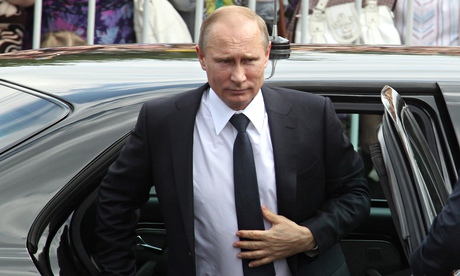Putin's hard line on MH17 will only push Russia into an ever-tighter corner
The Russian president has several routes of retreat in the face of growing pressure. He is unlikely to take any of them

Vladimir Putin: a shrewd tactician, but a poor strategist. Photograph: Sasha Mordovets/Getty Images
Although visibly embarrassed and increasingly cornered by
mounting evidence that rebels using missiles supplied by Moscow were
responsible for shooting down flight MH17, Vladimir Putin still has plenty of ways to extricate himself and his country from the disaster.
Yet all such options ultimately entail an admission that his policies in Ukraine are counterproductive: something the Russian president is loth to do. So the chances are high that Russia
will simply brazen out the crisis, regardless of any sanctions
threatened by the west. The long-term interests of the Russian nation
are being held hostage by the vanity of its leader.
A clever
Russian de-escalation tactic would be for Moscow to assist in the
immediate creation of an international committee of inquiry into the
carnage, and even grant the committee access to Russian soil.
That
carries the risk that the investigation would unearth unsavoury
connections between the Russian military and ethnic Russian separatists.
But the risks are manageable, partly because pro-Russian rebels have
already destroyed much of the incriminating evidence at the airliner's
crash site, and partly because the Buk missile system involved in the
Malaysian jet's destruction is manufactured in a single Russian factory
and operated by both the Ukrainian and Russian military.
The
"smoking gun" linking the particular missile that hit the airliner to
Russian arsenals is, therefore, never likely to be found, which will
mean Moscow has plenty of wriggle room. That is precisely why Barack
Obama and other western leaders have pointedly avoided any explicit
accusations that the missile that destroyed the Malaysian plane was
guided by Russian radar systems. Putin can appear to be co-operating
with the inquiry without risking all that much.
An equally
low-risk policy would be for Russia to accept the stationing of
international observers on its border with Ukraine, to prevent the
further smuggling of heavy weapons. Again, that would give little away,
since ethnic Russian separatists already have all the weapons they are
likely to need. And, again, western governments have offered Putin the
easy way out: a team of observers from the Organisation for Security and
Cooperation in Europe stands ready to be dispatched.
The
snag for Putin is that all these options would entail him accepting
that, at most, Russia would now only be able to obtain autonomy for
Russian-speakers in eastern Ukraine. The possibility of carving up
Ukraine in order to prevent the country from slipping into the western
sphere of influence would be gone, and probably for good, since the
Ukrainian authorities would then be able to re-establish control in the
eastern parts of their country. And that Putin is not prepared to
contemplate, because it would dent his carefully nurtured domestic image
as Russia's invincible leader.
What Putin is banking on instead
is the ability of his propaganda machinery to sow doubts about the
circumstances of the disaster, in the hope that the wave of indignation
will simply blow over with little damage to Russia.
Yet it is
unlikely that the strategy of sitting out the crisis would work to
Russia's advantage. International pressure to impose further sanctions
on Moscow could become unstoppable. The Malaysian airliner's tragedy
will embroil Russia in years of litigation. The families of the bereaved
will seek compensation. Arrest warrants will be issued against
individual Russian military commanders, and countries such as the
Netherlands and Australia, which lost so many of their citizens, will
demand satisfaction.
In his handling of the crisis, Putin has
again revealed himself as a good tactician – a shrewd short-term
operator. But he remains a poor strategist, and an obstacle to Russia's
future wellbeing.
Jonathan Eyal is director of international security studies at London's Royal United Services Institute
No comments:
Post a Comment